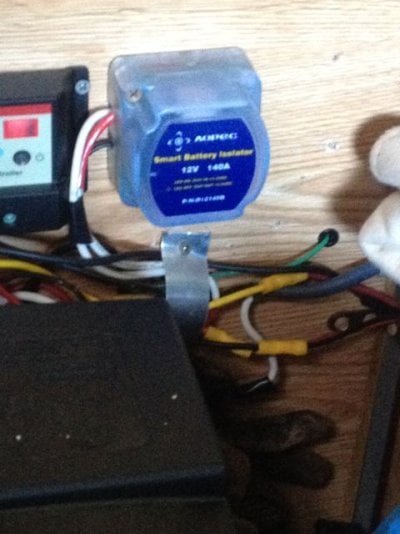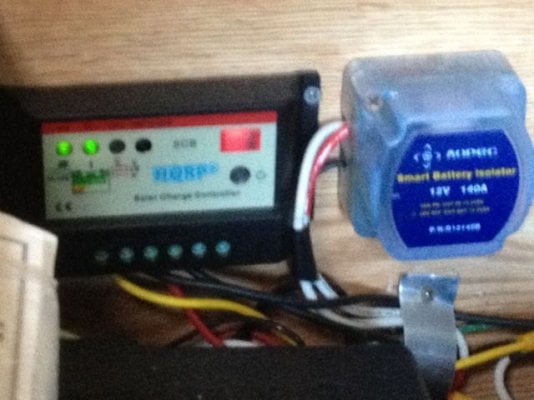RC Pilot Jim
Senior Member
After 3 months of researching this subject , I have re-written this report.
Summary (Deleted everything else as it is repeated in other posts)
Compressor refrigerators run off the battery or 110 volt shore power. Going down the road the truck alternator runs the "Refer" and charges the battery. When stopped to sight-see the "refer" runs off the battery discharging it over time. If the auxiliary battery gets to low(below 12 volts) - the "Sure Power Separator " disconnects the truck alternator to protect the truck battery.
It will not reconnect the alternator to the aux battery until an external solar panel or 110 volt charger - charges the battery back to 12.0 volts.
Solar Panel on your roof runs the "refer" when engine is off. And charges the battery. Alternator and solar "share" running the "refer" and charging the battery going down the road.
The large 65 Liter compressor "Refers" draw 3.5 - 5 amps per hour cycling on 50-70% (depends on how hot outside temp is) of the time. If you have one 80 amp battery you only have about 40 usable amps (roughly 50%).At average of 2.7 amps per hour you have about 15 hours of running time. If your camping without hookups you may not have enough reserve amps to run your lights, refer, water pump and heater overnight.
If you have older batteries you could have a problem if you do a lot of off-grid-camping.
Peace of mind
If your like me -you don't like surprises ...Especially when 50 miles in the back country. Putting a solar panel on the roof could give you peace of mind as it one less thing to worry about.
(2015) Four Wheel now installs one solar connector on the roof as a standard feature. The one on the back wall is still optional. At $50 better to buy it now. If you regularly camp in shaded woods you may need a portable solar panel.
You have a choice to buy the panel from the manufacture at time of purchase or third party company such as www.solarblvd.com or www.amsolar.com or whomever and install it in the future. Most cities have RV company's that install roof mount solar panels.
Summary (Deleted everything else as it is repeated in other posts)
Compressor refrigerators run off the battery or 110 volt shore power. Going down the road the truck alternator runs the "Refer" and charges the battery. When stopped to sight-see the "refer" runs off the battery discharging it over time. If the auxiliary battery gets to low(below 12 volts) - the "Sure Power Separator " disconnects the truck alternator to protect the truck battery.
It will not reconnect the alternator to the aux battery until an external solar panel or 110 volt charger - charges the battery back to 12.0 volts.
Solar Panel on your roof runs the "refer" when engine is off. And charges the battery. Alternator and solar "share" running the "refer" and charging the battery going down the road.
The large 65 Liter compressor "Refers" draw 3.5 - 5 amps per hour cycling on 50-70% (depends on how hot outside temp is) of the time. If you have one 80 amp battery you only have about 40 usable amps (roughly 50%).At average of 2.7 amps per hour you have about 15 hours of running time. If your camping without hookups you may not have enough reserve amps to run your lights, refer, water pump and heater overnight.
If you have older batteries you could have a problem if you do a lot of off-grid-camping.
Peace of mind
If your like me -you don't like surprises ...Especially when 50 miles in the back country. Putting a solar panel on the roof could give you peace of mind as it one less thing to worry about.
(2015) Four Wheel now installs one solar connector on the roof as a standard feature. The one on the back wall is still optional. At $50 better to buy it now. If you regularly camp in shaded woods you may need a portable solar panel.
You have a choice to buy the panel from the manufacture at time of purchase or third party company such as www.solarblvd.com or www.amsolar.com or whomever and install it in the future. Most cities have RV company's that install roof mount solar panels.




